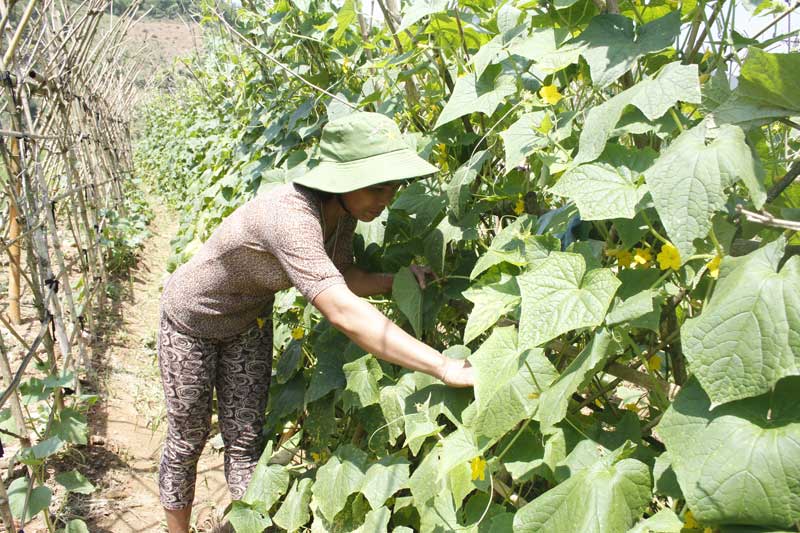
(HBO) – Xa Thi Tuyen in Chum Nua hamlet, Muong Chieng commune in Da Bac district said that her family planted cucumber in an area of 200 square metres and the vegetable sells like hot cakes while cucumber from other localities cannot find customers.
Photo: Xa Thi Tuyen in Chum
Nua hamlet, Muong Chieng commune, uses home-made herbal remedy instead of plant
protection products for her cucumber field to ensure food safety.
"Right from the beginning of the crop, I carefully prepared the soil and grew
the cucumbers organically by using well-rotted manure as fertiliser. Currently,
each kilogramme of my cucumber is sold at 10,000-15,000 VND. I also reduce the
use of plant protection products and especially use no herbicide in my rice and
maize fields”, Tuyen said.
Xa Thi Xu in Na Muoi hamlet, Muong Chieng commune said after she was told about
the harms of the use of too much plant protection chemicals to not only farmers
themselves but also to society and future generations, she has switched to
using garlic, chilli and bitter leaves to make spraying solutions. When she has
free time, she catches the caterpillars and removes weeds by hand instead of
using herbicide.
Xu plants cucumber, maize and rice. Since organic plantation was
applied in her fields, more people have come to purchase her products even at
higher prices, she said.
According to Chairman of Muong Chieng commune People’s Committee Xa Van Hung, the
communal party committee has ordered relevant authorities and mass
organisations to enhance popularisation work to raise public awareness about
the need to reduce the use of plant protection chemicals and stop the use of herbicide
in agricultural production. Many hamlets have made it a local rule not to use
pesticides.
Many households have switched to plants of higher economic value and
traditional cultivation methods using limited plant protection products. Herbicide
has no longer been used in cultivation in the commune. Local people make insect-killing
solutions from garlic, chilli and bitter leaves.
In addition, garbage is collected every Tuesday and Friday into a landfill
site, he added./.
With just over a month left until the school summer break, students are eagerly anticipating a period of rest and fun after a year of academic pressure. To provide a healthy environment for the physical development, in addition to the classes that foster talents and enhance the academic knowledge, sports and physical activities continue to attract a large number of children and teenagers.
On April 17th, Hoa Binh Provincial Museum organized a program to promote and introduce the outstanding values of "Hoa Binh Culture” at the Boarding Secondary and High School for ethnic minority students in Mai Chau District.
The Hoa Binh College of Technical Technology, in collaboration with the Hoa Binh Technical and Economic College and the provincial Association of Literature and Arts, hosted a gathering on April 15 to celebrate Laos’ traditional Bunpimay (New Year) Festival 2025 and debut the new book "Nguoi Muong o ban Don” (Muong people in Don village).
In the millennia-long history of national construction and safeguarding, people of all ethnic groups in Hoa Binh have been united and closely bound together to overcome all difficulties and challenges, standing alongside the entire Vietnamese people throughout the history of building and defending the country.
Living green is a healthy, positive, and sustainable lifestyle that not only helps protect
the environment and quality of life but also conserves natural resources and ecosystems.
Among the many ways to embrace this lifestyle, reducing plastic consumption is one of the most impactful.
The women's unions at all levels in Kim Boi district have been making significant contributions to the movement of building cultural life in the local community.
The movement helps improve rural look and the spiritual and material lives of local residents.



